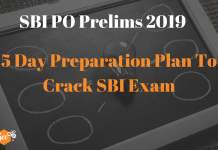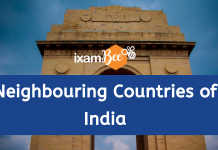Important Govt. Schemes for NABARD 2021 Exam
Key highlights of important govt. schemes for NABARD exam 2021:
1. Pradhan Mantri Vaya Vandana Yojana (PMVVY)
Launch Year:2017
Launched By: Ministry of Women and Child Development
Aim: The main aim of the govt scheme is to provide senior citizens with a regular pension during the time when there is a fall in interest rates.
Pradhan Mantri Vaya Vandana Yojana is a Non-Linked, Non-Participating, Pension Scheme subsidized by the Government of India. It is one of the important govt. schemes launched by GOI.
The scheme was introduced exclusively for senior citizens aged 60 years and above. The scheme was earlier effective from 4th May 2017 to 31st March 2020. With Pradhan Mantri Vaya Vandana Yojana (Modified-2020), the scheme is now extended for a further period of three years beyond 31st March 2020 i.e., up to 31st March 2023.
LIC of India operates this scheme through offline and online channels.
The scheme provides an assured return of 8% per annum for 10 years. For 31st March 2021, the Scheme will provide an assured pension of 7.40% p.a. payable monthly. This is equivalent to 7.66% per annum.
2. Pradhan Mantri Matsya Sampada Yojana (PMMSY)
Launch Year: 2020
Launched by: The scheme was initially announced by the Finance Minister, Nirmala Sitharaman while presenting the Union Budget for 2019-20 on July 05, 2019.
PMMSY was thereafter launched on Sept 10, 2020, through video conferencing in the presence of the Governor and Chief Minister of Bihar with the Union Minister & MoS for Fisheries, Animal Husbandry & Dairying.
Aim: The scheme aims at enhancing fish production and filling in all the existing infrastructural gaps while thoughtfully bringing development in the Fisheries sector. The scheme also intends to focus on the welfare of fish farmers & fishers simultaneously.
At the time of the launch of PMMSY, the then Minister of State for Fisheries, Animal Husbandry & Dairying was: Shri Giriraj Singh
The current Minister of State for Fisheries, Animal Husbandry & Dairying is Shri Parshottam Rupala.
Rs. 20,050 crores are the estimated investment set for the PM Matsya Sampada Yojana, comprising a Central share of Rs. 9,487 crore, State share of Rs 4,880 crore, and Beneficiaries contribution of Rs. 5,763 crore.
The Government aims to spend Rs 11,000 crore on exercises in marine, inland fisheries, and aquaculture.
Rs 9000 crore has been set aside to be utilized in assembling foundations, such as angling harbors and cold chains.
The investment of ₹20,050 crore under PMMSY is the highest ever in the fisheries sector
3. Prime Minister Krishi Sinchayee Yojana (PMKSY)
Launch Year: 2015
Launched by: Ministries of Agriculture, Water Resources, and Rural Development
Aim: The major objective of PMKSY is to
- provide a complete solution to farm level irrigation requirements and it has a tagline “Har Khet Ko Pani” which means assured irrigation for every farm
- achieve convergence of investments in irrigation at the field level
- expand cultivable area under assured irrigation
- improve on-farm water use efficiency to reduce wastage of water
- enhance the adoption of precision irrigation and other water-saving technologies (More crop per drop)
- enhance recharge of aquifers and introduce sustainable water conservation practices by exploring the feasibility of reusing treated municipal wastewater for peri-urban agriculture and attract greater private investment in the precision irrigation system
The scheme has basically combined three active projects under various ministries which are as follows:
- Accelerated Irrigation Benefit Program (Ministry of Water Resources)
- Integrated Watershed Management Program (Ministry of Rural Development)
- Farm Water Management project of the National Mission on Sustainable Agriculture
The project was allocated Rs.5,300 crores for the fiscal year 2015-16 and the total allocation for the next five years is expected to be around Rs.50,000 crores. These govt. schemes are revised yearly in the union budget.
4. Pradhan Mantri Kisan Samman Nidhi
Launch Date: December 01, 2018 (Announced in Budget 2019)
Pradhan Mantri Kisan Samman Nidhi (PM-KISAN) Scheme was announced in the budget session of 2019.
This is a centrally sponsored Agricultural scheme that provides direct income support of rupees 6000 to the framers.
In this scheme, there have more than 9.5 crore farmers, who have received the 9th installment this time on Aug 9, 2021.
Aim: Central Sector Scheme to provide income support to all landholding farmers’ families in the country to supplement their financial needs for procuring various inputs related to agriculture and allied activities as well as domestic needs.
Who is Eligible for the PM-KISAN Agriculture scheme?
It is given to all landholder farmers’ families in the country except the following.
- All Institutional Landholders.
- Farmer families in which one or more of its members are from the following:
- All serving or retired officers and employees of Central/ State Government Ministries /Offices/Departments and its field units Central or State PSEs and Attached offices /Autonomous Institutions under Government as well as regular employees of the Local Bodies.
- Former and present holders of constitutional posts.
- All Persons who paid Income Tax in the last assessment year.
- Ministers/ State Ministers, MPs (Lok Sabha & Rajya Sabha), MLAs (SLA & SLC) – Present or Former
- Mayors of Municipal Corporations, Chairpersons of District Panchayats- Present or Former
- All superannuated/retired pensioners whose monthly pension is Rs.10,000 or more (Excluding Multi-Tasking Staff / Class IV/Group D employees)
- Professionals like Doctors, Engineers, Lawyers, Chartered Accountants, and Architects registered with Professional bodies and carrying out profession by undertaking practices.
5. PM KISAN Maan Dhan Yojana
Launch Date: September 12, 2019 (Ranchi Jharkhand)
For whom: Centrally sponsored scheme for small and marginal farmers that owns less than two hectares of land
Aim: Pradhan Mantri Kisan Maandhan Yojana is a govt scheme meant for old age protection and social security of Small and Marginal Farmers
Eligibility:
- For Small and Marginal Farmers
- Entry Age between 18 to 40 years
- Cultivable land up to 2 hectares as per land records of the concerned State/UT
Features:
- Assured pension of Rs. 3000/- month
- Voluntary and Contributory Pension Scheme
- Matching Contribution by the Government of India
The required monthly contribution can be varied from rupees 55 to rupees 200 by the beneficiary (Depending on the age of the entry into the scheme).
Equal contribution (as the beneficiary contribution) made by the Centre into this scheme. LIC (Life Insurance Corporation of India) manages the pension fund.
6. Pradhan Mantri Annadata Aay SanraksHan Abhiyan’ (PM-AASHA)
Launch Date: September 12, 2018
It is a new umbrella scheme that aims to ensure lucrative prices to the farmers for their produce.
Components of PM-AASHA
- Price Support Scheme (PSS)
- Price Deficiency Payment Scheme (PDPS)
- Pilot of Private Procurement and Stockist Scheme (PPPS)
- PSS (Price Support Scheme): In PSS, the physical procurement of pulses, oilseeds, and Copra is done by Central Nodal Agencies with the proactive role of State governments.
- PDPS (Price Deficiency Payment Scheme): Under the Price Deficiency Payment Scheme (PDPS), all oilseeds are covered for which MSP is notified. This scheme does not involve any physical procurement of crops as farmers are paid the difference between the MSP price and the Sale/modal price on disposal in the notified market.
- PPPS (Pilot of Private Procurement & Stockist Scheme): In the case of oilseeds, States have the option to roll out PPSSs in selected districts. Under this, a private player can procure crops at MSP when market prices drop below MSP and whenever authorized by the state/UT government to enter the market. The private player will then be compensated through a service charge up to a maximum of 15% of the MSP.
Quick Fact
NAFED
- National Agricultural Cooperative Marketing Federation of India (NAFED) was established in 1958.
- It is registered under the multi-state cooperative societies act.
- Its objective is to promote co-operative marketing of agricultural produce to benefit the farmers.
FCI
The Food Corporation of India was set up under the Food Corporation’s Act 1964, with the following objectives –
- effective price support operations for safeguarding the interests of the farmers
- distribution of foodgrains throughout the country for public distribution system
- maintaining a satisfactory level of operational and buffer stocks of foodgrains to ensure National Food Security
Conclusion
Understanding important government schemes like PMVVY, PMMSY, PMKSY, PM-KISAN, PM KISAN Maan Dhan Yojana, and PM-AASHA is crucial for excelling in the General Awareness section of the NABARD Grade A and Grade B Exam. These schemes not only reflect the government’s initiatives towards various sectors but also provide insights into socio-economic policies and agricultural development strategies. Familiarity with these schemes enhances candidates’ comprehension of current affairs, contributing significantly to their overall preparation. Wishing all aspiring candidates the best of luck for their NABARD exam preparation endeavors!













